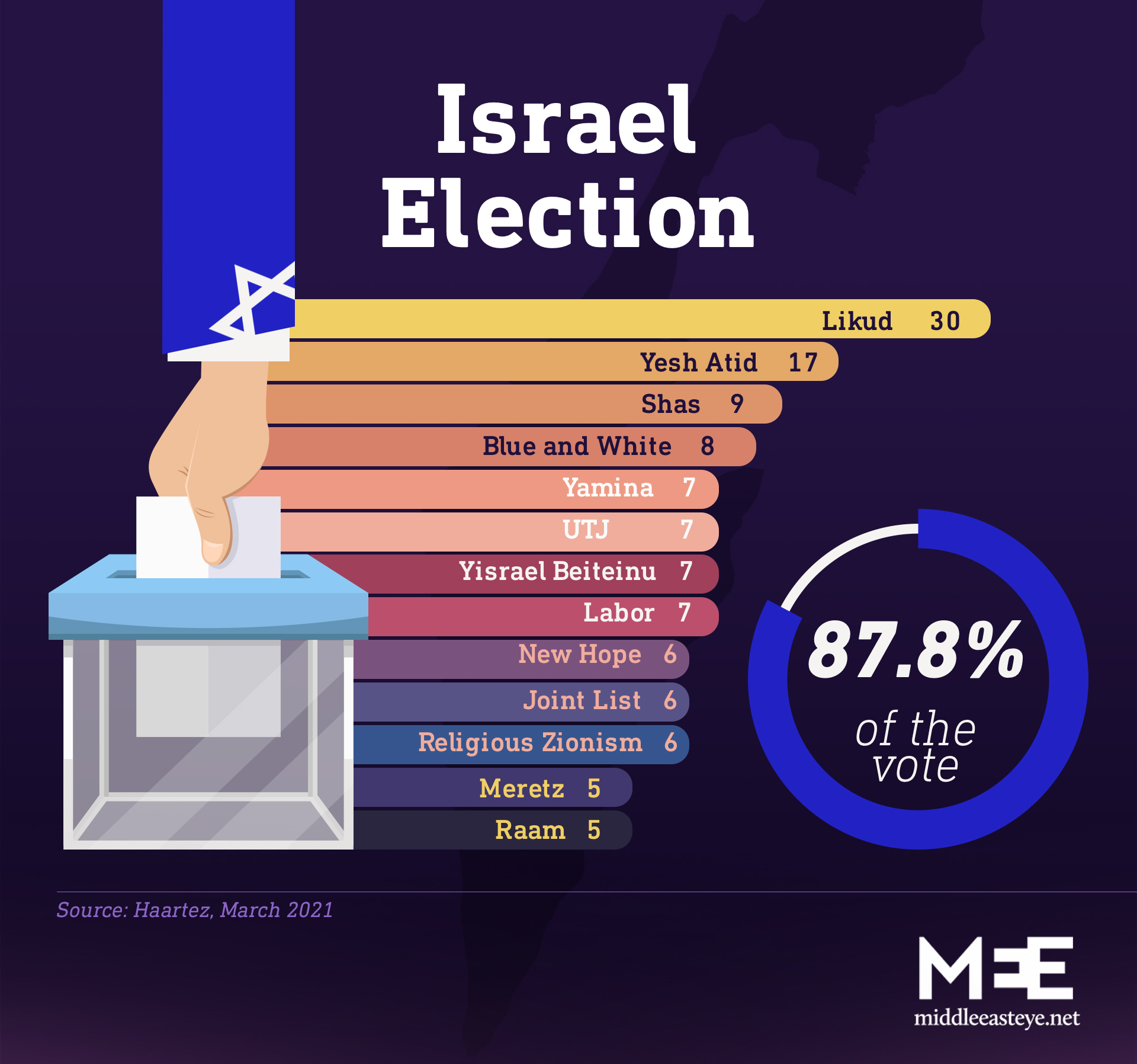Israel elections: Netanyahu has to marry strange bedfellows if he wants to form a government

The unbelievable happened at 9am on Wednesday morning, after a long and stormy election night: Raam, headed by Mansour Abbas, reached the electoral threshold and thus became the kingmaker that can secure Benjamin Netanyahu’s sixth term in office.
Significant questions remain. Can both Netanyahu and Abbas afford such a daring political move? Can Netanyahu’s radical, racist coalition rely on Arab support for survival? Can Abbas join, or even just support, a coalition with racist elements like the head of the Religious Zionism party Bezalel Smotrich and Rabbi Meir Kahane’s Arab-hating disciple Itamar Ben-Gvir?
This unprecedented political phenomenon is all Netanyahu’s doing. For his personal gain and survival, void of any ideology, Netanyahu embraced Abbas in a scheme to weaken Palestinian political representation, splitting Raam from the Arab Joint List.
On the other end of the spectrum, Netanyahu single-handedly created the far-right Religious Zionism monster and actively encouraged Israelis to vote for them instead of his own Likud to secure the size of his bloc, as well as the possible subsequent annulment of his corruption trial.
He offered the Religious Zionism option to Israelis dedicated to keeping him in power, as well as those on the far-right determined to undermine the judicial system for their own ends.
New MEE newsletter: Jerusalem Dispatch
Sign up to get the latest insights and analysis on Israel-Palestine, alongside Turkey Unpacked and other MEE newsletters
It nearly got him the strong bloc he needed, but not quite.
Netanyahu and his allies are now stuck with 59 seats only, at least two short of the necessary majority to form a feeble but viable government.
A near-impossible task lies before Netanyahu: convince Ben-Gvir and Abbas to come to an arrangement, despite the former insisting he’d never sit in a government even supported by Palestinians, and the latter having a tough job justifying why he’d do so.
Fifteen minutes into the 9am update that turned Israel’s election on its head, Likud minister Tzachi Hanegbi already stated that Netanyahu’s party would be willing to form a coalition based on Abbas’s support but without his partnership in the government.
“Abbas himself said he doesn’t want to be a member of the government,” Hanegbi said on Channel 12.
“We cannot have in our coalition an Arab MP who represents a party that denies the very essence of Israel as a Jewish democratic state,” he said, before adding: “Support from the outside in return for benefits for the Arab sector - we can.”
A fifth election?
That is not necessarily the prevailing sentiment in Likud, but that is how you prepare public opinion for something that is almost inconceivable for the Israeli right wing, but might be crucial for the survival of its leader.
Alternatively, that is how you set the scene for reaching out to members of the anti-Netanyahu camp, encouraging them to cross to the other side and “save Israel” from these political dire straits. All for the good of the country, of course.
Above everything still hangs the sword of Damocles in the prospect of a fifth round of elections, an unbearable thought. Again, Israelis would be told this has to be done “for the good of the country”.
The strange, inconsistent bloc for “change” committed to ousting Netanyahu is as of now practically irrelevant.
Any way you look at it, Israel is about to have the most radical government ever. A fifth round, if that disastrous scenario materialises, is not going have a happy conclusion
At the worst, it can become a reservoir for the deserters Netanyahu will be looking for to boost his numbers and get his bloc over the 61-seat line. He already insinuated he has some.
Any way you look at it, Israel is about to have the most radical government ever. A fifth round, if that disastrous scenario materialises, is not going have a happy conclusion.
The only one who might have a vested interest in another round may be Benny Gantz, head of the Blue and White party. That scenario can offer him the rotation premiership embedded in the still-active coalition agreement with Netanyahu.
A Likud source told Middle East Eye that they still believe that, despite their traumatic partnership in the outgoing government, Gantz might join Netanyahu’s future coalition.
“He and his people are not made for opposition. They are doers by nature. We don’t count them out,” the source said.
Gideon Saar’s New Hope party was quick to declare “count us out”. It vowed again not to join Netanyahu’s coalition and stay in opposition.
Lessons in the results
A fourth round of elections in just two years has left Israel more confused than before.
Some tendencies deserve special attention: Palestinian citizens of Israel are under-represented, with just six going to the Joint List and Abbas picking up five. A big fall from the 15 seats they won in March 2020.
Changes within the Palestinian society in Israel cannot go unnoticed. It may be the time for the revival of the notion of a real, solid Palestinian-Jewish party. In an awkward, ugly way, Netanyahu legitimised this kind of partnership. That was not his intention, but this is the outcome.
The centre-left emerged stronger than expected. Erroneous polls almost wiped out all of the left. That did not happen.
Meretz, with five seats, survived. Labor was revived, winning seven. Gantz’s Blue and White is by far the biggest surprise of these elections, taking eight.
Meretz worked for the pity vote; Gantz cast himself as the good guy who was a victim of the villainous Netanyahu. Both tactics seemed to have saved them.
Though alive and kicking, the left offers no alternative to the rule of the right, however.
The identity of the left has been tarnished by the artificial entity that is the “Just not Bibi” bloc, which brought together parties right of Likud and remnants of the left.
It did not work, and obviously could not work. Free of this partnership, the left will have to re-shape its identity and re-define its role in opposition against a racist homophobic coalition, if one is formed.
There is a lesson for the right wing, too.
Both Saar and Yamina leader Naftali Bennet made an electoral attempt to disengage themselves from the “Bibist” right’s total focus on Netanyahu, and form a state-oriented right wing, similar to what Menachem Begin’s Likud and old national-religious Zionism used to be.
Saar’s six seats and Bennett’s seven prove it is a mission impossible. That right wing is practically non-existent anymore. Netanyahu (and demography) changed the core of the right, if not forever, at least for a long time to come.
Horsetrading
So what is going to happen? Tricky reality calls for some humility in prophesising.
Not all votes have been counted and some changes may still apply. Even pompous Netanyahu did not declare victory this time, and remained humble enough to talk about a “great achievement” only.
In the meantime, he is caught between Abbas and Bennett. He cannot form a coalition without Bennett, and Bennett cannot politically afford another round of elections. He might be completely wiped out.
In his first speech after the exit polls, the Yamina leader promised a “leadership not focused on itself but rather on the good of the people”. Lapid still promises a “sane government”. No one fully understands the cryptic messages in these statements.
Netanyahu is caught between Abbas and Bennett. He cannot form a coalition without Bennett, and Bennett cannot politically afford another round of elections. He might be completely wiped out.
The coming days will be dedicated to speculation and behind-the-scenes calls and exchanges among all the players. It has already begun: Abbas and Lapid promised to meet before Friday; Netanyahu and Bennett already spoke.
One scenario kind of floats in the air: what if Bennett and Saar join forces and pass a law that forbids an indicted candidate to form a government. In this case, the candidate is Netanyahu. His trial on corruption charges is to resume on 5 April.
Such a move makes sense, but its feasibility is almost nonexistent. It is less about politics and more about fear.
The images of Donald Trump’s Capitol riots are still on everybody’s mind. In a way, Netanyahu and his people were already undermining the credibility of the Central Elections Committee and accusing it of forgery and misconduct before polling day. They will not go lightly.
This is not the right atmosphere for bold moods. “It ain’t over until it’s over,” as the saying goes.
The problem is, it’s never over. Or, as Albert Einstein defined insanity: “doing the same thing over and over and expecting different results”. Even this wise man did not take into consideration the variant of Israeli politics.
This article is available on Middle East Eye French edition.
Middle East Eye delivers independent and unrivalled coverage and analysis of the Middle East, North Africa and beyond. To learn more about republishing this content and the associated fees, please fill out this form. More about MEE can be found here.






